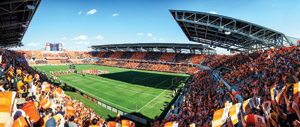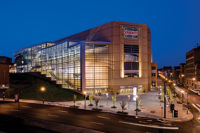David McKenzie knows a thing or two about Houston sports stadiums.
McKenzie is a former building engineer at the Houston Astrodome and moved over to Minute Maid Park when that facility, which houses Major League Baseball’s Houston Astros, opened in 2000.
Now McKenzie is front-and-center as the chief building engineer at Houston’s newest marvel, the 22,000-seat BBVA Compass Stadium that serves as the home for Major League Soccer’s Houston Dynamo and Texas Southern University’s football team. The $95 million facility opened on the east end of downtown Houston last year and is loaded with not only state-of-the-art architectural characteristics, but the latest in green products and technologies.
The stadium, whose naming rights are owned by banking company BBVA Compass, earned a LEED Silver certification from U.S. Green Building Council in December 2012. “From 2000 to 2012 the difference with all these energy-saving products is unreal,” McKenzie says.
BBVA Compass Stadium is filled with low-flow fixtures that reduce water use by 41% from a calculated baseline. All men’s restrooms feature American Standard waterless urinals with the exception of the first urinal in the line, which uses a 0.125-gpf flush valve to flush out the waterless models. Toilets feature 1.28-gpf flush valves (toilets and flush valves by American Standard). All bathroom flush valves and American Standard faucets are battery-operated and motion-sensor activated.
Elkay drinking fountains throughout the facility are fitted with 1/4-in. water lines to further reduce water usage. “This isn’t like a 3/8- or 1/2-in. line that would wash your face if you got too close,” McKenzie says. “There is a strong water-saving element there.”
The facility’s domestic water and irrigation systems are tied together through the use of Grundfos variable-speed pumps.
“The irrigation is usually separate from the domestic water,” McKenzie explains. “It’s all together here. This method saves money and energy and time by not having the separate irrigation pump setup. You don’t have the added maintenance and you don’t use the extra energy needed for those pumps. The pumps are efficient and adjustable and we’re able to lower our domestic water pressure. We’ve gone from 85 psig down to 74 psig and that does not affect the irrigation distance with how far the water comes out of the sprinkler head. We’re able to maintain quality irrigation on the field.”
Lochinvar high-efficiency water heaters with Leonard Valve Co. mixing valves further contribute to the lower energy costs, while the use of longer lifespan Aquatherm polypropylene-random piping reduces the potential for future maintenance costs. Each room in the facility is outfitted with a Mitsubishi or Trane high-efficiency cooling unit, eliminating the need for a central heating-cooling plant.
The stadium uses energy-conserving LED lights and sourced more than 98% of total wood-based building materials from an FSC-certified forest.
Anshutz Entertainment Group, the owner of the facility and numerous others throughout the world, says energy use at the stadium will be reduced by 20.41% by using the ASHRAE 90.1-2007 baseline calculation methodology. Kansas City, Mo.-based Populous was the architect on the project.
BBVA Compass Stadium is the first new LEED Silver sports facility in Houston and joins other venues such as Barclays Center in Brooklyn, N.Y. (home of the NBA’s Brooklyn Nets) and Jeld-Wen Stadium (home of MLS’ Portland Breakers) in Portland, Ore., in achieving the Silver designation.
“Our energy provider recently wrote a letter saying it was impressed with the amount of energy we’re saving,” McKenzie says. “I’m a very firm believer in if you don’t need it, don’t use it. We’re saving a lot of water and energy here.”
HELPFUL LINKS:


